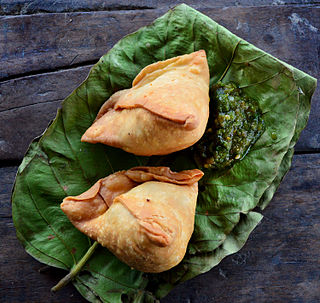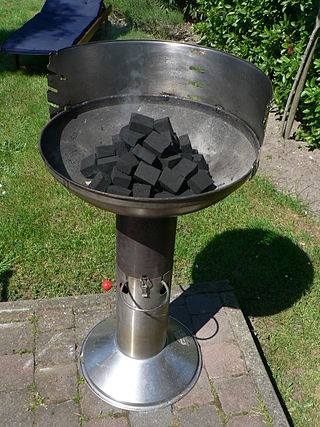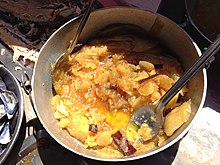
French fries, and chips, finger chips, french-fried potatoes, or simply fries are batonnet or allumette-cut deep-fried potatoes of disputed origin from Belgium or France. They are prepared by cutting potatoes into even strips, drying them, and frying them, usually in a deep fryer. Pre-cut, blanched, and frozen russet potatoes are widely used, and sometimes baked in a regular or convection oven; air fryers are small convection ovens marketed for frying potatoes.

Barbecue or barbeque is a term used with significant regional and national variations to describe various cooking methods that employ live fire and smoke to cook the food. The term is also generally applied to the devices associated with those methods, the broader cuisines that these methods produce, and the meals or gatherings at which this style of food is cooked and served. The cooking methods associated with barbecuing vary significantly but most involve outdoor cooking.

Apple sauce is a purée made of apples. It can be made with peeled or unpeeled apples and can be spiced or sweetened. Apple sauce is inexpensive and is widely consumed in North America and some parts of Europe.

The sweet potato is a dicotyledonous plant that belongs to the bindweed or morning glory family, Convolvulaceae. Its large, starchy, sweet-tasting tuberous roots are used as a root vegetable. The young shoots and leaves are sometimes eaten as greens. Cultivars of the sweet potato have been bred to bear tubers with flesh and skin of various colors. Sweet potato is only distantly related to the common potato, both being in the order Solanales. Although darker sweet potatoes are often referred to as "yams" in parts of North America, the species is even more distant from the true yams, which are monocots in the order Dioscoreales.

Potato salad is a salad dish made from boiled potatoes, usually containing a dressing and a variety of other ingredients such as boiled eggs and raw vegetables.

A samosa is a fried South Asian and Iranian Dish, It is a pastry with a savoury filling, mostly vegetables, spiced potatoes, onions, peas, also non-vegetarian meat, or fish. It is made into different shapes, including triangular, cone, or crescent, depending on the region. Samosas are often accompanied by chutney, and have origins in medieval times or earlier. Sweet versions are also made. Samosas are a popular entrée, appetizer, or snack in the cuisines of South Asia, the Middle East, Central Asia, East Africa and their South Asian diasporas.

A latke is a type of potato pancake or fritter in Ashkenazi Jewish cuisine that is traditionally prepared to celebrate Hanukkah. Latkes can be made with ingredients other than potatoes such as cheese, onion, carrot, and zucchini.

A fritter is a portion of meat, seafood, fruit, vegetables, or other ingredients which have been battered or breaded, or just a portion of dough without further ingredients, that is deep-fried. Fritters are prepared in both sweet and savory varieties.

Kugel is a baked casserole, most commonly made from lokshen or potato. It is a traditional Ashkenazi Jewish dish, often served on Shabbos and Jewish holidays. American Jews also serve it for Thanksgiving dinner.

South African cuisine reflects the diverse range of culinary traditions embodied by the various communities that inhabit the country. Among the indigenous peoples of South Africa, the Khoisan foraged over 300 species of edible food plants, such as the rooibos shrub legume, whose culinary value continues to exert a salient influence on South African cuisine. Subsequent encounters with Bantu pastoralists facilitated the emergence of cultivated crops and domestic cattle, which supplemented traditional Khoisan techniques of meat preservation. In addition, Bantu-speaking communities forged an extensive repertoire of culinary ingredients and dishes, many of which are still consumed today in traditional settlements and urban entrepôts alike.
African cuisine is a staple of the continent's culture, and its history is entwined with the story of the native people of Africa. The foods that native Africans eat have been influenced by their religions, as well as by their climates and lifestyles. The first Africans to inhabit the continent were hunter-gatherers who ate what they could find in nature. As agriculture became more common in Africa, so did agriculture-based diets.

Ugali, also known as posho, nsima, papa, pap, sadza, isitshwala, akume, amawe, ewokple, akple, and other names, is a type of corn meal made from maize or corn flour in several African countries: Kenya, Uganda, Tanzania, Zimbabwe, Zambia, Lesotho, Eswatini, Angola, Mozambique, Namibia, DRC, Malawi, Botswana and South Africa, and in West Africa by the Ewes of Togo, Ghana, Benin, Nigeria and Cote D'Ivoire. It is cooked in boiling water or milk until it reaches a stiff or firm dough-like consistency. In 2017, the dish was added to the UNESCO Representative List of the Intangible Cultural Heritage of Humanity, one of a few foods in the list.

Malva pudding is a sweet pudding of South African origin. It contains apricot jam and has a spongy caramelised texture. A cream sauce is always poured over it while it is hot, and it is usually served warm with cold custard and/or ice-cream. Many South African restaurants offer it. The pudding is thought to originally be of Dutch then Cape Dutch origin synonymous with the Cape.

Barbecue varies by the type of meat, sauce, rub, or other flavorings used, the point in barbecuing at which they are added, the role smoke plays, the equipment and fuel used, cooking temperature, and cooking time.

The cuisine of the Democratic Republic of the Congo and the Republic of the Congo varies widely, representing the food of indigenous people. Cassava, fufu, rice, plantain and potatoes are generally the staple foods eaten with other side dishes.

A fishcake is a culinary dish consisting of filleted fish or other seafood minced or ground, mixed with a starchy ingredient, and fried until golden.

Bobotie is a South African dish consisting of spiced minced meat baked with an egg-based topping.

Dumpling is a broad class of dishes that consist of pieces of cooked dough, often wrapped around a filling. The dough can be based on bread, wheat or other flours, or potatoes, and it may be filled with meat, fish, tofu, cheese, vegetables, or a combination. Dumplings may be prepared using a variety of cooking methods and are found in many world cuisines.
Blatjang is a South African chutney made of dried fruit and chillies cooked in vinegar and a staple in most South African households, served as a condiment with South African meat dishes like bobotie and braai.

















